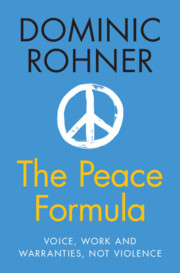Book contents
- The Peace Formula
- The Peace Formula
- Copyright page
- Dedication
- Contents
- Acknowledgments
- Part I Apocalypse No!
- Part II The Logic of Evil
- Part III Give Peace a Chance!
- 6 Power to the People
- 7 State Capacity for Stability
- 8 Plenty Makes Peace
- 9 Forgiving Not Fighting
- 10 A Role for All of Us?
- 11 Global Coordination to Curb Conflict
- Part IV The Art of Peace
- Notes
- Bibliography
- Index
9 - Forgiving Not Fighting
Fostering Trust and Reconciliation
from Part III - Give Peace a Chance!
Published online by Cambridge University Press: aN Invalid Date NaN
- The Peace Formula
- The Peace Formula
- Copyright page
- Dedication
- Contents
- Acknowledgments
- Part I Apocalypse No!
- Part II The Logic of Evil
- Part III Give Peace a Chance!
- 6 Power to the People
- 7 State Capacity for Stability
- 8 Plenty Makes Peace
- 9 Forgiving Not Fighting
- 10 A Role for All of Us?
- 11 Global Coordination to Curb Conflict
- Part IV The Art of Peace
- Notes
- Bibliography
- Index
Summary
This chapter argues that building strong institutions and a productive economy in the aftermath of conflict is not enough and that rebuilding lost social capital and trust is of paramount importance. Intergroup trust matters deeply, as the same formal institutions can have divergent effects in different social structures and for different levels of social capital. Starting from the so-called contact hypothesis that fostering positive intergroup interaction builds trust, it is argued that reconciliation and the rebuilding of social trust are also part of the promising blend of propeace policies. A variety of empirical studies are discussed, ranging from reconciliation efforts in Rwanda and Sierra Leone to programs fostering intergroup contacts in Spain, Nigeria, India and Iraq. While we find that more intense group contacts deploy typically desirable effects, trying to achieve reconciliation by altering beliefs through media campaigns is a double-edged sword that involves a series of dangers. We conclude this chapter by stressing the key role of stepping up critical thinking.
- Type
- Chapter
- Information
- The Peace FormulaVoice, Work and Warranties, Not Violence, pp. 132 - 150Publisher: Cambridge University PressPrint publication year: 2024



